Getting patients to take their medications as directed can cut health-care costs, but improving their pill-taking habits can be difficult, researchers say.
As part of their research into the issue, a team at the University of Chicago conducted two studies. The first found that patients with mild to moderate ulcerative colitis who consistently took a prescribed medication — 5-aminosalicyclic acid (5-ASA) — had 12.5 percent lower medical costs than patients who did not comply with the therapy.
"Patients with ulcerative colitis often struggle to comply with current 5-ASA treatments because they have to take multiple pills throughout the day. This study shows that following your doctor's advice, even when it's inconvenient, is worth the extra effort," study director Dr. Sunanda Kane, an associate professor of medicine, said in a prepared statement.
She and her colleagues found that young and old patients were least likely to comply with their 5-ASA therapy. Compliance rates were: 57 percent for patients aged 40 to 64; 55 percent for those aged 18 to 40; 41 percent for those over age 65; and 35 percent for those under age 18. Males and females had similar compliance rates.
"What if we simplify a patient's regimen with a reduced pill burden, ideally a once-daily treatment? Would patients be more likely to comply, and would that lower health care expenses?" Kane wondered.
But a second study conducted by Kane and her team suggested that simply reducing pill count may not be enough to improve patient compliance. The study of 1,680 ulcerative colitis patients found that the number of prescribed pills per day had no effect on compliance.
The patients took either 4, 6, 9 or 16 pills a day. In all four groups, compliance decreased from 100 percent at the start of the study to about 65 percent after three months.
"What it all means is that we have a lot more to learn about patient behaviors," Kane said.
The findings from both studies were expected to be presented this week at the American College of Gastroenterology annual meeting, in Las Vegas. The cost study was funded by Shire Pharmaceuticals, and the dosing study by Proctor & Gamble.


 June 07, 2022
June 07, 2022 








